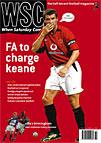 Brendan Fatchett, the former station manager of Teamtalk 252, says football clubs have become too greedy in their demands over radio rights
Brendan Fatchett, the former station manager of Teamtalk 252, says football clubs have become too greedy in their demands over radio rights
While a great deal of attention has been paid to football’s problems with television, many fans may not have considered whether they are getting a good deal from radio broadcasters. Is there enough competition, or are we on the verge of finding too many sporting rights in the hands of too few broadcasters?
The answer may lie in the ruins of the chaos that was once ITV Digital. The explosion of digital TV channels meant that TV broadcasters suddenly found themselves with lots of airtime and not enough DIY and makeover programmes to fill the space. So, perhaps understandably, they trusted that football, and more specifically the Nationwide League, would kill two birds with one stone – hours of live coverage backed by a reasonable sized audience. After all it had been a success for Sky, so why would it not be a success for ITV?
The answer may seem simple now – unreliable technology coupled with high subscription and technology costs, not to mention an inferior product – but at the time it must have seemed a fantastic way of persuading more customers to part with their hard earned cash and join the digital age. However, it failed to attract those customers. Most sports fans likely to be interested in the package had already committed themselves to Sky and could not afford to subscribe to yet another digital platform.
For football on TV there was only ever one choice and that was Sky. It is a similar story in radio. Nobody comes close to having the rights packages that the BBC has. They have exclusive national commentary rights to the Premiership and have recently secured a deal with the Football League for the next two seasons. That contract gives Five Live commentary rights to matches in the Football League, the League play-offs and the Worthington Cup. However, the worrying thing for supporters is that despite lots of additional coverage, some of it will now appear on Five Live’s digital service.
As we know, money talks in the world of sport but for fringe sports (which is how the Nationwide League should think of itself) the lack of exposure could soon become a problem. Five Live Extra would be a great bonus if you could listen to it in the car or on a conventional radio at home. But you can’t, because it is broadcast on digital radio, which as yet very few people have. So where does that leave fans? Once again they will have to pay if they want to enjoy all of Five Live’s sporting rights – a digital radio costs around £100.
The competition has battled hard over the past three years to highlight the ongoing bundling of rights by the BBC. Earlier this year they were joined by another national sports radio station, Teamtalk 252. Launched in March, the station hoped to provide detailed coverage of all sports, but principally football. However, that prospect lasted only until the beginning of August, when new owners turned the station off and sold the frequency back to the Irish state broadcaster RTE.
When the station was conceived it was decided from the outset not to chase football commentary rights, but instead to provide a rolling sports news format. There were two reasons for this: first, the Premiership was already committed to the BBC; and second, the station wanted to fill the sizeable gaps left in the BBC’s coverage of the Nationwide and the Scottish Leagues. The plan was to send reporters to many more matches to cover them in a similar style to Sky’s highly successful Soccer Saturday.
At every turn, however, Teamtalk 252 was met with demands for thousands of pounds just to provide a couple of updates during and after the games. As a small station with just over 400,000 listeners, this kind of outlay simply could not be sustained through advertising and sponsorship in the present climate. By contrast, Teamtalk 252 made agreements with a number of other sports, including cricket, basketball and ice hockey. In these cases the governing bodies wanted coverage and were prepared to sacrifice immediate revenue in an effort to promote the sport, attract sponsors and service the needs of the fans.
In the end you are left wondering just how much the expectation that all media companies will pay large fees is damaging the long-term health of the game. For example, Teamtalk 252 could not cover any Bradford City or QPR games, because they refused point-blank to recognise the station, even though from the outset it championed the Nationwide League. Fans of those financially troubled clubs were left with a simple choice – either hope for scraps on Five Live, tune in to local stations only, or buy a digital radio. The message from too many clubs right now is that unless you are prepared to pay over the odds, you simply won’t get in.
With competition in the radio market now back to its pre-Teamtalk 252 days, fans will only have two national stations left to listen to. This could mean fans of smaller clubs will once again struggle to get reports and updates from the matches that matter to them. The Nationwide League is now finding to its cost that if nobody watches your competition then nobody is going to pay millions to cover it. The same might be said if nobody is bothering to listen. And alienating stations that want to promote the League seems like the quickest way to achieve that outcome.
From WSC 188 October 2002. What was happening this month